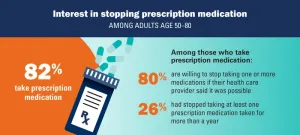(Press-News.org) As the movement toward “deprescribing” medications among older adults grows, a new poll shows strong interest in this idea.
A full 80% of adults aged 50 to 80 would be open to stopping one or more of the prescription medicines they’ve been taking for more than a year, if a health care provider said it was possible. Already, 26% said they have done so in the past two years.
Of those willing to stop a medicine, 67% said they would likely ask for advice about doing so at their next visit with a provider, according to the new findings from the University of Michigan National Poll on Healthy Aging.
But the poll also shows the importance of communication between patients and providers when deprescribing – a concept that includes both decreasing and stopping a medication because a temporary health condition has resolved, the medicine might clash with others, or the overall benefits and risks of taking it have changed.
“Deprescribing, which can include prescription medications, over-the-counter medications, and dietary supplements, should be based on dialogue between patients and providers, and sometimes family members,” says Sarah Vordenberg, Pharm.D., M.P.H., a U-M College of Pharmacy clinical associate professor who worked on the poll.
More than a third of older adults who said they had stopped taking a prescription medicine they’d been on for more than a year, and didn’t start on a replacement for it, said they did so without talking with a health professional such as a doctor, pharmacist or nurse practitioner.
The poll is based at the U-M Institute for Healthcare Policy and Innovation and supported by AARP and Michigan Medicine, the University of Michigan’s academic medical center.
The poll has implications for many older adults, because it finds that 82% of people age 50 to 80 take at least one prescription medicine regularly. Of them, 28% say they believe they take too many medicines.
More than half of those polled take three or more prescription medications. In addition, 11% of those polled regularly take three or more over-the-counter medicines and 38% take three or more vitamins, minerals or supplements.
Medication reviews needed
The poll suggests more people should take advantage of a little-known benefit offered by Medicare and other insurance: a comprehensive medication review by a pharmacist or other provider.
“While we found that over 90% of older adults who take at least one prescription medicine expect their provider to review their list of medicines at least annually, research has shown this is often not the case,” Vordenberg adds. “This drives home the importance of comprehensive medication reviews, which can often be billed to insurance by clinics and pharmacies as a separate patient encounter.”
“Another key aspect of deprescribing conversations and comprehensive medication reviews should be cost, because inability to afford medications can lead people to stop taking or alter the dose of medications that are important to their health,” says poll director Jeffrey Kullgren, M.D., M.P.H., M.S., an associate professor of internal medicine at Michigan Medicine and physician and researcher at the VA Ann Arbor Healthcare System.
“In our poll, cost was a driver behind stopping a medication for 15% of older adults with health or disability issues that limit their daily activities, twice as high as the percentage for those without these conditions,” he says.
People with a health problem or disability that limits their usual activities, and those who said they were in fair or poor physical or mental health, were also nearly twice as likely overall to say they had stopped taking a medication in the past two years, compared to those in better health.
More than a third (38%) of those taking five or more prescription medications also said they had stopped taking a medication, compared with 23% of those taking three to four prescription medications and 17% of those taking one to two prescription medications.
In 2020, a previous report from the National Poll on Healthy Aging found that 24% of adults age 50 to 80 who take two or more prescription drugs, and 25% of those who have Medicare Part D prescription drug plans, had had a comprehensive medication review. The vast majority of those who had not had a CMR were unaware that their insurance might cover the cost of such a review.
“Adults ages 65 and older take 4.6 medications per month on average,” said Susan Reinhard, Senior Vice President at AARP Public Policy Institute. “It’s important that patients not only have regular communication about the risks and benefits of each prescription with health care providers, but also with loved ones and family caregivers. Research shows improved outcomes when family members help make decisions in the deprescribing process.”
The poll report is based on findings from a nationally representative survey conducted by NORC at the University of Chicago for IHPI and administered online and via phone in January 2023 among 2,563 adults aged 50 to 80. The sample was subsequently weighted to reflect the U.S. population. For the previous poll, a different sample of older adults was asked about medication use and comprehensive medication reviews, but both samples were weighted to reflect the population of U.S. adults aged 50 to 80.
Read past National Poll on Healthy Aging reports and about the poll methodology.
END
As “deprescribing” medicines for older adults catches on, poll shows need for patient-provider dialogue
Majority of people over 50 are open to stopping one or more of their medications -- but some of those who already did so didn’t talk with a health provider first
2023-04-24
ELSE PRESS RELEASES FROM THIS DATE:
If it pays to be a jerk, why isn’t everyone that way?
2023-04-24
DURHAM, N.C. -- Throw a tantrum. Threaten, shove aside or steal from your colleagues. Science confirms, yet again, that brutish behavior can be an effective path to power. And not just in humans, but in chimpanzees, too.
A new study appearing April 24 in the journal PeerJ Life and Environment found that male chimps with more bullying, greedy and irritable personalities reached higher rungs of the social ladder and were more successful at siring offspring than their more deferential and conscientious counterparts.
But if that’s the case, researchers ask, why isn’t every chimp a bully?
A team led by researchers at the ...
New neurosurgery research: Surgical versus nonsurgical treatment of pituitary apoplexy
2023-04-24
The first prospective study comparing outcomes in patients with pituitary apoplexy—sudden bleeding or death of a pituitary tumor—found that patients managed medically fared as well as those treated surgically in the majority of cases. The multicenter international study, led by Cedars-Sinai investigators, was presented today at the American Association of Neurological Surgeons Scientific Meeting in Los Angeles.
“This is the best data to date on the question of surgery versus medical management in patients with this rare but serious condition,” said Adam Mamelak, MD, co-director ...
AAAS announces winners of the inaugural Mani L. Bhaumik Breakthrough of the Year Award
2023-04-24
The American Association for the Advancement of Science’s (AAAS) inaugural Mani L. Bhaumik Breakthrough of the Year Award — focused on standout contributors to NASA’s James Webb Space Telescope (JWST) — honors three individuals who supported vast swaths of the JWST community over decades and whose persistence amid multiple setbacks ensured the mission’s completion.
The award recognizes Major General Charles Frank Bolden Jr., USMC (Ret), a former administrator of the National Aeronautics and Space Administration (NASA); John Mather, senior project scientist of the JWST since 1995; and Bill Ochs, JWST project manager from 2011 through the telescope’s ...
Do vitamin D levels affect the body’s response to anti-cancer immunotherapy?
2023-04-24
Study’s findings suggest that maintaining normal vitamin D levels may benefit patients.
New research indicates that for patients with advanced skin cancer, it may be important to maintain normal vitamin D levels when receiving immunotherapy medications called immune checkpoint inhibitors. The findings are published by Wiley online in CANCER, a peer-reviewed journal of the American Cancer Society.
Vitamin D has many effects on the body, including regulation of the immune system. To see whether levels of vitamin D might impact the effectiveness of immune checkpoint inhibitors, investigators analyzed the blood of 200 patients with advanced melanoma both before and every 12 weeks ...
Drug combination restores ability of leading treatment to signal for death of blood cancer cells
2023-04-24
Despite the promise of new medications that promote cancer cell death in people with acute myeloid leukemia, leukemic cells often adopt features that let them evade the drugs’ effects within a year.
Now, new research using human tissue samples and mouse models has found that resistance of leukemia cells to a widely prescribed drug called venetoclax occurs because of a rapid increase in the breakdown and turnover of mitochondria, structures inside the cell that help power its functions. In addition to their role in producing energy, mitochondria also tell cells to die under certain adverse conditions.
This process of “programmed cell ...
Increased risk of testicular cancer in people with neurodevelopmental disorders
2023-04-24
A new study by researchers at Uppsala University and Uppsala University Hospital shows that men who have a neurodevelopmental disorder, such as autism and ADHD, also have a slightly increased risk of testicular cancer, or seminoma. This is the first study to show such a link, with the results to be published in the British Journal of Cancer.
Testicular cancer is the most common form of cancer in young men, and its underlying causes are still largely unknown.
“As testicular cancer can be surgically removed, thus curing the disease, it is important to seek care in time if you feel a lump in your testicle,” notes Ingrid ...
Single CT scan in kids low risk for cancers, but 4 or more CTs increases risk
2023-04-24
For children under age 18 years, a single computed tomography (CT) scan is not associated with an increased risk of brain tumours, leukemia or lymphoma, but exposure to 4 or more scans before adulthood more than doubles the risk, according to new research https://www.cmaj.ca/lookup/doi/10.1503/cmaj.221303 in CMAJ (Canadian Medical Association Journal).
Computed tomography in children has increased worldwide in recent decades, but there is conflicting evidence about the risks of cancer from these ...
New programmable smart fabric responds to temperature and electricity
2023-04-24
A new smart material developed by researchers at the University of Waterloo is activated by both heat and electricity, making it the first ever to respond to two different stimuli.
The unique design paves the way for a wide variety of potential applications, including clothing that warms up while you walk from the car to the office in winter and vehicle bumpers that return to their original shape after a collision.
Inexpensively made with polymer nano-composite fibres from recycled plastic, the programmable fabric can change its colour and shape when stimuli are applied.
“As a wearable material alone, it has almost infinite potential ...
International study recommends replacing skull section after treatment for a brain bleed
2023-04-23
A major international trial has concluded that, where possible, surgeons should replace the removed section of the skull following surgery to treat a form of brain haemorrhage. This approach will save patients from having to undergo skull reconstruction further down the line.
The RESCUE-ASDH trial, funded by the UK’s National Institute for Health and Care Research (NIHR), involved 40 centres in 11 countries and involved 450 patients. The results of the trial are published today in the New England Journal of Medicine and are announced at the annual meeting of the American Association of Neurological ...
Achieving prevention and health, rather than more healthcare
2023-04-23
If more people have access to health insurance, we have to be sure the death rates of those with certain chronic conditions are decreasing.
This is one of the statements Gregory Peck, an acute care surgeon and associate professor at Rutgers Robert Wood Johnson Medical School, will be researching on behalf of the National Institute of Diabetes and Digestive and Kidney Diseases (NIDDK) at the National Institutes of Health.
Funded by NIH grants totaling more than $1 million through a recent two-year award from the New Jersey Alliance for Clinical and Translational Science (NJ ACTS), a Rutgers hub of the National Center for Advancing ...
LAST 30 PRESS RELEASES:
Machine learning tool can predict serious transplant complications months earlier
Prevalence of over-the-counter and prescription medication use in the US
US child mental health care need, unmet needs, and difficulty accessing services
Incidental rotator cuff abnormalities on magnetic resonance imaging
Sensing local fibers in pancreatic tumors, cancer cells ‘choose’ to either grow or tolerate treatment
Barriers to mental health care leave many children behind, new data cautions
Cancer and inflammation: immunologic interplay, translational advances, and clinical strategies
Bioactive polyphenolic compounds and in vitro anti-degenerative property-based pharmacological propensities of some promising germplasms of Amaranthus hypochondriacus L.
AI-powered companionship: PolyU interfaculty scholar harnesses music and empathetic speech in robots to combat loneliness
Antarctica sits above Earth’s strongest “gravity hole.” Now we know how it got that way
Haircare products made with botanicals protects strands, adds shine
Enhanced pulmonary nodule detection and classification using artificial intelligence on LIDC-IDRI data
Using NBA, study finds that pay differences among top performers can erode cooperation
Korea University, Stanford University, and IESGA launch Water Sustainability Index to combat ESG greenwashing
Molecular glue discovery: large scale instead of lucky strike
Insulin resistance predictor highlights cancer connection
Explaining next-generation solar cells
Slippery ions create a smoother path to blue energy
Magnetic resonance imaging opens the door to better treatments for underdiagnosed atypical Parkinsonisms
National poll finds gaps in community preparedness for teen cardiac emergencies
One strategy to block both drug-resistant bacteria and influenza: new broad-spectrum infection prevention approach validated
Survey: 3 in 4 skip physical therapy homework, stunting progress
College students who spend hours on social media are more likely to be lonely – national US study
Evidence behind intermittent fasting for weight loss fails to match hype
How AI tools like DeepSeek are transforming emotional and mental health care of Chinese youth
Study finds link between sugary drinks and anxiety in young people
Scientists show how to predict world’s deadly scorpion hotspots
ASU researchers to lead AAAS panel on water insecurity in the United States
ASU professor Anne Stone to present at AAAS Conference in Phoenix on ancient origins of modern disease
Proposals for exploring viruses and skin as the next experimental quantum frontiers share US$30,000 science award
[Press-News.org] As “deprescribing” medicines for older adults catches on, poll shows need for patient-provider dialogueMajority of people over 50 are open to stopping one or more of their medications -- but some of those who already did so didn’t talk with a health provider first



